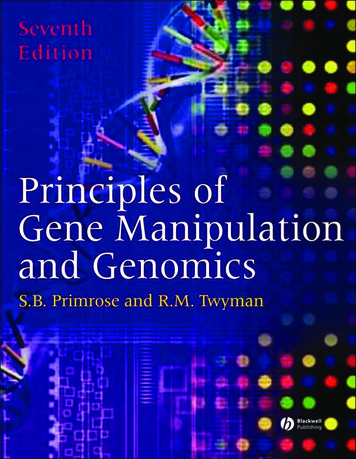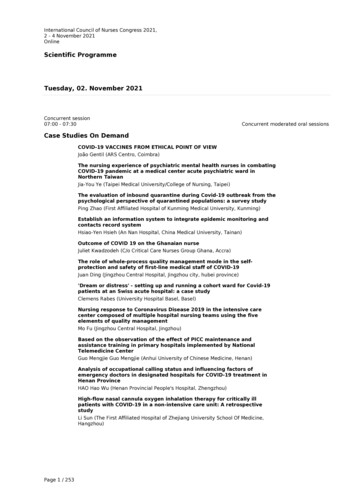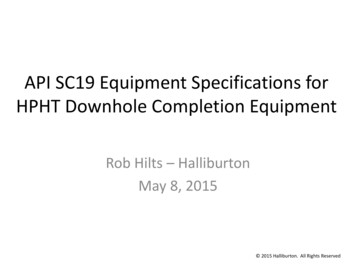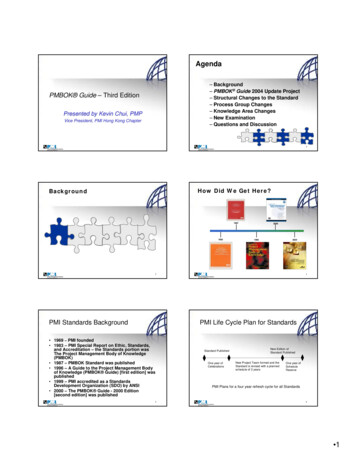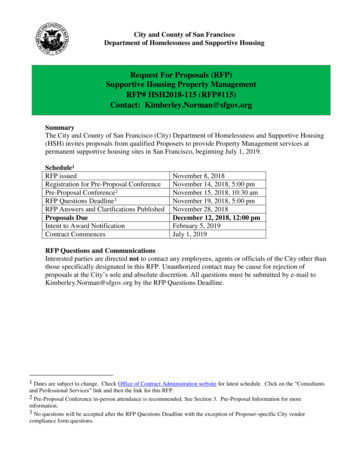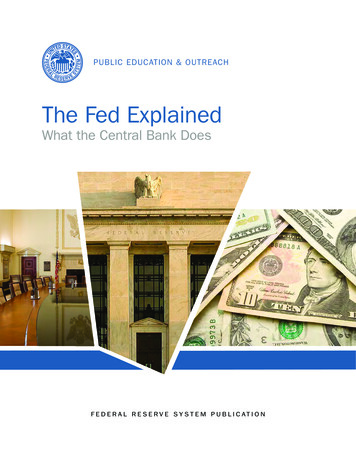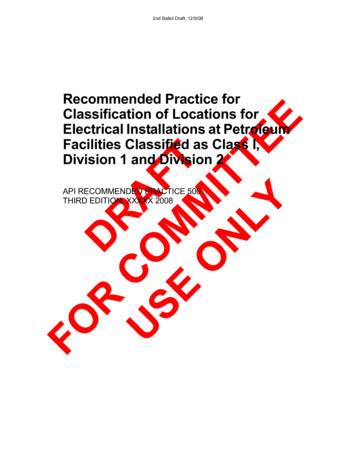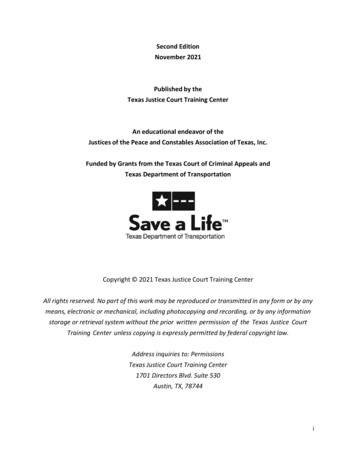
Transcription
Second EditionNovember 2021Published by theTexas Justice Court Training CenterAn educational endeavor of theJustices of the Peace and Constables Association of Texas, Inc.Funded by Grants from the Texas Court of Criminal Appeals andTexas Department of TransportationCopyright 2021 Texas Justice Court Training CenterAll rights reserved. No part of this work may be reproduced or transmitted in any form or by anymeans, electronic or mechanical, including photocopying and recording, or by any informationstorage or retrieval system without the prior written permission of the Texas Justice CourtTraining Center unless copying is expressly permitted by federal copyright law.Address inquiries to: PermissionsTexas Justice Court Training Center1701 Directors Blvd. Suite 530Austin, TX, 78744i
Table of ContentsUser Notes . 1Chapter 1: Record Retention .2A. Records That Must Be Kept by a Justice of the Peace . 21. General Requirement .2.2Specific Requirements 3a. Civil Docket 3b. Civil Case Fee Book . .4c. Criminal Docket . . 4d. Witness Fees . . 4e. Collection of Money .53.Records that Do Not Have to Be Kept . 54.When a Justice Vacates Office . 55.Delivery of Documents Upon Demand .6B. Maintaining Records Electronically . . . 61.Standards and Procedures . 62.Destruction of Source Document . . 7C. Records Management Program . . 71.Records Management Officer. . 72.Required Form .8D. Destruction of Records . . 81.When a Record May Be Destroyed . . . 8a. Retention Schedules . 9b. Why Destroy Records? 102.Restrictions on the Destruction of Records . . . . . 103.Method and Procedure for Destruction . 10a. Records Disposition Log . .4.11Liability . 11E. Training and Resources . 11ii
Chapter 2: Public Access to Records . 13A. Judicial Records vs. Court Case Records . .13B. Release of Judicial Records (Rule 12) . 141.2.Governed by Rule 12 of the Texas Rules Judicial Administration . 14a. Definitions . 15b. Applicability .15General Rules .16a. Judicial Records Open to the Public . .16b. What Courts Do Not Have to Do . 16c. Records Can Be Made Public Voluntarily . .173.Exemptions from Disclosure .174.Procedures for Request and Response . .19a. Requirements for Request . . 19b. Time and Place for Inspection and Delivery . 19c. Portions of a Record Not Subject to Disclosure Must Be Redacted . 20d. If a Recipient of a Request is not the Custodian of the RequestedRecord . . 205.e. Cannot Ask the Purpose of the Request . .20f. Uniform Treatment of Requests .20Costs for Copies .21a. Costs . . 21b. Waiver or Reduction of Costs . 21c. Appeal of Cost Assessment . . 216.d. Records Custodian Not Personally Responsible for Cost .22Denial of Access .22a. When a Request May Be Denied . .22b. Contents of a Denial Notice . 227.Appeal . .23a. Requirements of Petition for Review . 23b. Notifications and Formation of Special Committee .23iii
c. Response to the Petition for Review . 24d. Decision .24e. Notice and Publication of Decision . 258.Sanctions . 25C. Release of Court Case Records . . 251.Governed by Common Law and Statutes .252.General Rule . 253.When Access to Records Are Limited . . 26a. Sealed or Subject to Non-Disclosure Order . . 26b. Subject to Expunction Order . .26c. Arrest Warrants, Search Warrants, and Supporting Affidavits . 26d. Protected Person’s Address when Emergency Protective Order is Issued27e. Vacated Emergency Protective Orders .27f. Fine-only Misdemeanors More than Five Years Old . 27g. Juvenile Fine-only Misdemeanors Other than a Traffic Offense . 28h. Mental Health Case Records . .29i.Truancy Cases .30j.Juror Information Sheets . .31k. Common Law Privacy Exception 31l.Vehicle for Improper Purposes 324.Procedures . 325.Costs for Copies .336.Appeal . .33D. Liability 33E. Record Request Flowcharts . 34Chapter 3: Reporting Requirements . 35A. DPS Reporting Requirements .1.Failure to Appear in a Criminal Case 3535a. “Omni” Reporting . 35iv
b. Failure to Appear for a Transportation Code Ch. 521 Offense . 352.c. Failure to Appear by a Juvenile . 36d. Failure to Appear by a Defendant with an Out-of-State License . .37Disposition of a Criminal Offense . . 38a. General Reporting Requirements . . 38b. Traffic Cases .38c. Alcohol Cases Involving Minors . 40d. Tobacco Cases Involving Minors . . 41e. Graffiti Cases 42f. Family Violence Cases . .42g. Diversion Programs . 43h. When a Conviction Has Been Appealed .453.If the Defendant Fails to Satisfy a Judgment . 454.Magistration . 47a. Magistrate’s Order for Emergency Protection . 47b. Bond Conditions in Violent Offense Cases .49c. Ignition Interlock Device Bond Condition 50Truancy . .51a. Remedial Orders .51b. Failure to Obey a Remedial Order . .516.License Suspension Hearings 517.Occupational Driver’s Licenses 528.Reporting Logistics . .525.a. Method for Reporting, Forms, and DPS Contact Information . 52b. Correcting Errors .53c. Rejected Reports . 54B. OCA Reporting Requirements . 541.Required Reports . . 542.Protective Order Registry . 55v
C. Inquest Reporting Requirements .55D. Reporting Requirements Related to Collecting Money .55E. Other Reporting Requirements .551.Alcoholic Beverage Commission . 552.Federal Immigration and Customs Enforcement Division . .553.Justice of the Peace’s Financial Activity . .56a. Requirements of the Statement .56b. Filing Dates . . 58c. Timeliness of Filing . . 58d. Public Access to Financial Statements . .59e. Notification to Prosecuting Attorney for Failure to File a FinancialStatement . 59Chapter 4: Recordkeeping and Reporting for Ex-Officio Notary Public and LocalRegistrar Roles . .61Appendix of Cases .62vi
User NotesThis deskbook on Recordkeeping and Reporting (2nd ed. November 2021) represents theTexas Justice Court Training Center’s ongoing commitment to provide resources,information and assistance on issues of importance to Texas Justices of the Peace andConstables and their court personnel, and continues a long tradition of support for judicialeducation in the State of Texas by the Justices of the Peace and Constables Association ofTexas, Inc.We hope you will find it to be a valuable resource in providing fair and impartial justice tothe citizens of Texas.This deskbook is intended to offer a practical and readily accessible source of informationrelating to issues you are likely to encounter regarding recordkeeping and reporting injustice court. It is not intended to replace original sources of authority, such as theGovernment Code, Local Government Code, Transportation Code, Code of CriminalProcedure, the Texas Rules of Judicial Administration, or the Texas Rules of CivilProcedure. We strongly recommend that you refer to the applicable statutory provisionsand rules when reviewing issues discussed in this book.Please note that all references to “Rule” are to the Texas Rules of Civil Procedure, andall references to “TSLAC” are to the Texas State Library and Archives Commission.Rather than including the citations to cases in the text of the deskbook, we have listedonly the case name in the text but have included the entire citation in the appendix ofcases.Please do not hesitate to contact us should you have any questions or commentsconcerning any of the matters discussed in Recordkeeping and Reporting.Texas Justice Court Training CenterNovember 20211
Chapter 1: Record RetentionA.Records That Must Be Kept by a Justice of the Peace1.General RequirementEach justice shall arrange and safely keep alldockets, books, and papers transmitted to thejustice by the justice’s predecessors, and all papersWho Keeps Magistrationfiled in a proceeding in justice court. GovernmentPaperwork?Code § 27.004(a). Any other records that documentthe transaction of public business or are otherwiseA justice of the peace must keeprequired by law or statute must also be kept.all papers related to magistrationuntil the case gets filed in a higherThese records are required to be kept whether theyare created or received by the court, and they couldexist in any form, including paper, e-mail, electronicfile, video, etc. For more information on maintainingrecords electronically, see page 6 of this volume.court.Once filed, the justice must sendall original documents to the courtthat now has jurisdiction.Important Tip!Keep your personal and business e-mails in separate accounts. Any e-mails relatedto court business are records and must be kept.Examples of categories of records that must be kept can be found in the local retentionschedule for justice and municipal court records that was created by the Texas StateLibrary and Archives Commission (TSLAC). The length of time that a particular record mustbe kept depends on its category. This will all be discussed further in the “Destruction ofRecords” section, starting on page 8 of this volume.All records must be kept whether they are open or closed and whether they are publicinformation or not. Public access to records is discussed in Chapter 2 of this volume.2
Tips for making sure records are kept safely: Decide who, within the court, is responsible for keeping which records;o This could be a clerk, different clerks for different record types, or the judge; Decide whether the record copy will be a hard copy or maintained electronically; Additional copies should be disposed of as soon as they’re no longer needed (forreference, disaster preparedness, historical preservation, etc.), but not until after itis confirmed that the “record copy” has been kept.2.Specific Requirementsa.Civil DocketA justice of the peace is required to keep a civil docket, which must contain the followinginformation: the title of all suits filed with the court, the date when the first process was issued against the defendant, when theprocess was returnable, and the nature of the process, the date the parties appeared before the court, a description of the petition and any documents filed with the petition, every adjournment, stating at whose request it was made and at what time, the date of the trial, stating whether it was before a jury or a judge, the verdict of the jury, if any, the judgment signed by the judge and the date it was signed, all applications for setting aside judgments or granting new trials, orders on applications for setting aside judgments or granting new trials, the date of issuing execution, to whom directed and delivered, and the amount ofdebt, damages and costs, and when any execution is returned, the date of thereturn, and the manner in which it was executed, and all stays and appeals that may be taken, the date when taken, and the amount ofthe bond and the name of the sureties.Rule 507.3(a).3
b.Civil Case Fee BookA justice of the peace must keep a fee book in which all costs accruing in every civil suitcommenced before the court are taxed. Rule 507.3(b).c.Criminal DocketA justice of the peace is required to keep a criminal docket, which must contain thefollowing information: the style and file number of each criminal action, the nature of the offense charged, the plea offered by the defendant and the date the plea was entered, the date the warrant, if any, was issued and the return made, the date the examination or trial was held, and if a trial was held, whether it wasby a jury or by the justice, the verdict of the jury, if any, and the date of the verdict, the judgment and sentence of the court, and the date each was given, the motion for new trial, if any, and the decisions, and whether an appeal was taken and the date of that action.Code of Criminal Procedure Art. 45.017.d.Witness FeesThe justice of the peace shall maintain a record, separate from the docket, of: the number and style of each criminal action before the court; the name of each witness subpoenaed, attached, or recognized to testify in theaction; and whether the witness was a witness for the state or for the defendant.Code of Criminal Procedure Art. 102.002.The purpose for keeping a separate record is because the county may ultimately beresponsible for costs accumulated in a case. A defendant is liable on conviction for thefees for witnesses in the defendant's case. If a defendant convicted of a misdemeanordoes not pay the defendant's fines and costs, the county or municipality, as appropriate, is4
liable for the fees for witnesses in the defendant's case. Code of Criminal Procedure Art.102.002.If a person is subpoenaed as a witness in a criminal case and fails to appear, the personsubpoenaed is liable for the costs of an attachment, unless he shows good cause to thecourt why he did not appear. Government Code § 573.081(a).e.Collection of MoneyRecordkeeping requirements related to collecting money can be found in the Fines, Fees,and Costs Deskbook.3.Records that Do Not Have to Be KeptThe following are examples of records that specifically do not have to be kept by a justicecourt: records ordered expunged by a court order (Local Government Code § 202.001), convenience copies: “Extra identical copies of documents created only forconvenience of reference or research” (Local Government Code § 201.003(8)(A)),4. extra copies of documents furnished to the public as part of a records request, blank forms/stocks of publications, library or museum materials, alternative Dispute Resolution working files.When a Justice Vacates OfficeWhen a person vacates the office of justice of the peace, that person shall transfer allcourt records, documents, property, and unfinished business to their successor on thedate the successor takes office. If there is no successor, the governing body shalldetermine which officer of the local government shall have custody. Government Code §27.004(a-1); Local Government Code § 201.006(a).5
5.Delivery of Documents Upon DemandA person who has possession of dockets, books, or papers belonging to the office of anyjustice of the peace shall deliver those dockets to the new justice on demand. GovernmentCode § 27.004(b).If the person refuses to deliver them, the person may be attached and jailed by the orderof a county judge until the person makes delivery, if a motion supported by an affidavit isfiled and the person to be attached is given three days’ notice of the motion. GovernmentCode § 27.004(b).B.Maintaining Records ElectronicallyAll records may be created and/or stored electronically, at the discretion of the judge.Government Code § 27.058; Code of Criminal Procedure Art. 45.017(b); Local GovernmentCode Chapter 205; Texas Administrative Code Title 13, Chapter 7.Note that even if a state law relating to the keeping of records by a local governmentofficer or employee requires the records to be kept in a "book," "record book," or "wellbound book," or contains any similar requirement that a record be maintained in boundpaper form, the record may be maintained on microfilm or stored electronically unless thelaw specifically prohibits those methods. Local Government Code § 201.004.1.Standards and ProceduresIf a court decides to keep records electronically, theymust ensure that the court will be able to access allelectronic records for their full retention periods.CLICKHERERetention PeriodFor information on standards and procedures forA “retention period” is the lengthmaintaining electronic records, see TSLAC’s “Localof time that a record must be keptGovernment Bulletin B: Electronic Records Standardsdepending on what type of recordand Procedures”.it is. This will be discussed furtheron page 8 of this volume.6
2.Destruction of Source DocumentIf there is an original hard copy version of a record, it can be destroyed once the electronicversion is created. However, before destroying the original, the court must test: that the electronic version is complete and of good quality; and that the court is able to locate and retrieve the electronic version when needed.If a court is using a new software system, it should keep the source documents for at leastsix months until the court is sure that the system is working properly.For more information regarding requirements for the destruction of source documents,see TSLAC’s “Local Government Bulletin B, Section 205.008: Destruction of SourceCLICKHEREDocuments”.C.Records Management Program1.Records Management OfficerEach elected justice of the peace is the records management officer (RMO) for the recordsof his or her office. Local Government Code § 203.001. However, a justice of the peace candesignate the current county-wide RMO (if there is one) to be the RMO for the justice’srecords. Local Government Code § 203.005(g). Note, however, that if the justice of thepeace does this, the justice is still the custodian of their court’s records and still has all ofthe duties discussed above.If the justice of the peace is the RMO, they shall: develop policies and procedures for the administration of an active and continuingrecords management program; administer the records management program so as to reduce the costs andimprove the efficiency of recordkeeping; identify and take adequate steps to preserve records that are of permanent value; identify and take adequate steps to protect the essential records of the office; ensure that the maintenance, preservation, microfilming, destruction, or otherdisposition of records is carried out in accordance with the policies and procedures7
of the records management program and the requirements of this subtitle andrules adopted under it, and cooperate with the commission in its conduct of statewide records managementsurveys.Local Government Code § 203.002.TSLAC shall provide advice and assistance to records management officers in establishingrecords management programs and in carrying out other requirements. Local GovernmentCode § 203.004.If the justice of the peace is not the RMO, then they should consult with their county-wideRMO to find out what retention schedules the county is using (how long each type ofrecord must be kept) and any other procedures and policies that must be followed.More information on retention schedules can be found on page 9 of this volume.2.Required FormThere is a required form that all justices of the peace must file with TSLAC, whether theyare the RMO or not: “Form SLR 512 – Records Management Policy and Declaration ofCompliance by an Elected County Official.”The form and instructions for filling it out and filing itCLICKHEREcan be found ction of RecordsDefinitionsRetention Schedule: A documentthat lists categories of records, with1.When a Record May Be Destroyedmandatory minimum retentionperiods for each category.A record may be destroyed if: it is the source document of an electronicrecord and no longer needs to be kept (seepage 7 of this volume for more information);Retention Period: The minimumamount of time you are legallyrequired to keep a record.8
it is part of a record category listed on an approved retention schedule and theretention period has expired; it appears on a list of obsolete records approved by the director and librarian; a destruction request is filed with and approved by the director and librarian for arecord not listed on an approved control schedule; it was ordered to be destroyed by anexpunction order, or it is an exempt record as defined by rulesRetention Schedule vs. Statuteadopted by the commission or listed asexempt in a records retention scheduleIf there is a requirement in aissued by the commission.statute that a record must be keptLocal Government Code § 202.001(a),(b).for a certain amount of time, and itis different from what the retentiona.Retention Schedulesschedule says: The court should keep theA retention schedule is a document that listsrecord for whichever period isdifferent categories of records and the minimumlonger (this way theamount of time (the “retention period”) that you arerequirements of both are met).legally required to keep records for each category.Example: Code of CriminalSome categories must be kept permanently. TheProcedure Art. 15.17 requires acategories are based on the nature of the contentjudge to keep magistrationand not the form of the record. For example, arecords for a timeframe that ispaper document and an electronic file that are bothshorter than the retentionpart of a civil case would be in the same category asperiod listed for this type ofeach other.record in the LC retentionschedule (see Chapter 2 of theTSLAC has created the following retention schedulesMagistration Deskbook). So, thethat are relevant to justice court:court would follow theretention schedule. Local Schedule GR: for records common to alllocal governments; andIf a statute requires a particularrecord to be destroyed: Local Schedule LC: for records specific tojustice and municipal courts. the court must follow thestatute.9
Retention Schedules and Additional InformationCLICKHEREA county can impose stricter requirements than what is in these schedules, but not lessstrict requirements. Most counties just adopt TSLAC’s retention schedules, but the recordsmanagement officer will have information on if a county has adopted retention schedulesthat are different from the two above.b.Why Destroy Records?You might wonder why bother destroying records at all? Wouldn’t it be easier to not messwith all of the requirements and just keep all records permanently? However, destroyingeligible records: creates room for newer records and speeds up retrieval; reduces operating, equipment, storage, supply, and personnel costs; and shows that the court’s record management system is an active and continuingprogram as required by law.2.Restrictions on the Destruction of RecordsA record may not be destroyed until the matter is resolved if it is involved in any ongoing: litigation, claim, audit, or open records request.Local Government Code § 202.002.Destroying a record that falls into one of these categories could result in liability issues orKEYPOINTa criminal offense.3.Method and Procedure for DestructionGenerally, you do not need permission to destroy records once the retention period isover.10
A local government record may be destroyed by burning, shredding, pulping, burial in alandfill, or by sale or donation for recycling purposes, except that records to which publicaccess is restricted may be destroyed only by burning, pulping, or shredding. LocalGovernment Code § 202.003(a)&(b). For more information on when public access isrestricted, see Chapter 2 of this volume.A local government that sells or donates records for recycling purposes shall establishprocedures for ensuring that the records are rendered unrecognizable as localgovernment records by the recycler. Local Government Code § 202.003(c).The director and librarian of TSLAC may approve other methods of destruction that renderthe records unrecognizable as local government records. Local Government Code §202.003(d).a.BESTPRACTICERecords Disposition LogIt is not required that a court keep a records disposition log of all records destroyed, but itis strongly recommended.A blank disposition log form can be found 4.LiabilityA custodian of local government records, records management officer, or other officer oremployee of a local government may not be held personally liable for the destruction of arecord if the destruction is in compliance with the rules discussed above. LocalGovernment Code § 202.007.E.Training and ResourcesTSLAC has a variety of training resources, which can be found ing.11
TSLAC has a blog, called The Texas Record, that has useful information and updatesregularly posted on it. You can subscribe to the blog to receive notifications of new posts.The blog can be found here: https://www.tsl.texas.gov/slrm/blog/.CLICKHEREIf you have a question or need assistance regarding record retention and management: The general contact information for TSLAC’s state and local records managementstaff can be found here: https://www.tsl.texas.gov/slrm/contact. You can also contact the analyst assigned to your county for more one-on-oneassistance. You can search for your analyst /countylist.12
Chapter 2: Public Access to RecordsJustice court records are public property and any person is entitled access to those recordsexcept where expressly limited by law. Local Government Code § 201.005(a); GovernmentCode § 552.001(a).As discussed in Chapter 1 of this volume, the justiceof the peace is the custodian of the justice courtrecords and is responsible for properly respondingto requests for those records. This chapter will coverNo Personal PropertyRights to Recordswhen access to justice court records is limited andthe procedures for the request and release of justiceA local government officer orcourt records.employee does not have, by virtueof the officer's or employee'sA.Judicial Records vs. Court CaseRecordsThe rules and procedures for access to a justicecourt’s records depend on the type of record it is.There are two types of records: Judicial records, and Court case records.position, any personal or propertyright to a local government recordeven though the officer oremployee developed or compiledit. Local Government Code §201.005(b).See the chart below for the definitions, examples, and where you find the procedures forrelease for the two types of records.Note that the Public Information Act (PIA) is not mentioned in the chart. This is becauseCOMMONPITFALLthe PIA covers record requests for government documents kept by certain governmentalentities, but it does not apply to the judiciary. Government Code § 552.003, 552.0035.13
Procedures forDefinitionsExamplesJudicialMade or maintained byDisasterFollow Rule 12 of theRecordsor for a court or judicialpreparedness plan,Texas Rules of Judicialagency in its regularpersonnel records,Administration.course of business; andpayments to courtSee pages 14-25 of thisnot a “court caseappointed attorneysvolume for morerecord.”and ad litems.information.Court CaseCreated or filed inPleadings, motions,Follow the relevantRecordsconnection with anyjudgments.common law (based onReleasematter that is or hasdecisions from courtbeen before a court.cases).Pertaining to a court’sBlank forms,Except where a specific“adjudicative function”information packets.statute or rule applies to(the court’s role ina certain type of recordhearing and deciding– then follow that.cases)
b. Civil Case Fee Book A justice of the peace must keep a fee book in which all costs accruing in every civil suit commenced before the court are taxed. Rule 507.3(b). c. Criminal Docket A justice of the peace is required to keep a criminal docket, which must contain the following information: the style and file number of each criminal action,
